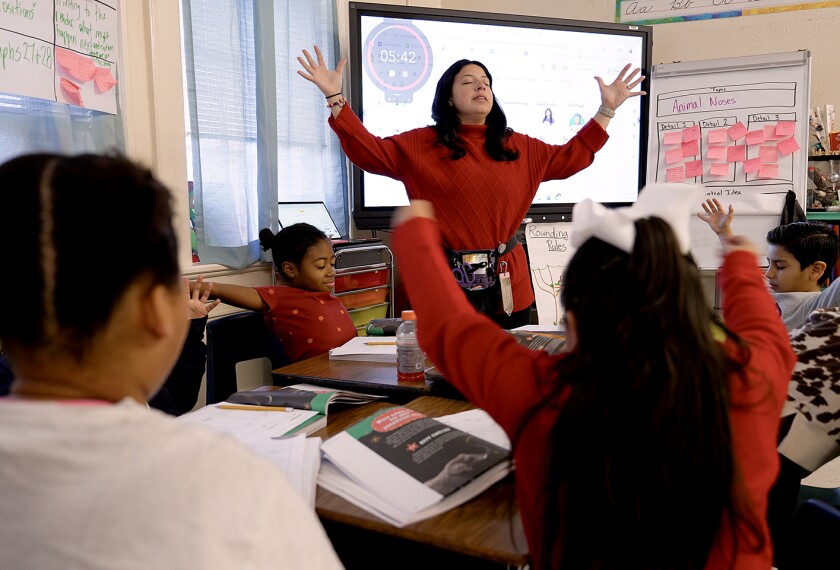Researchers, policymakers, and district leaders alike have raised serious concerns about how social media and cellphones are negatively affecting teens’ social skills and mental health.
But teens have a more nuanced view. A spring survey of 1,056 high-school-age teens by the EdWeek Research Center found them nearly evenly divided on whether social media’s impact on their mental health and well-being had been positive, neutral, or negative. And the kids surveyed listed a range of benefits to being on social media, including developing positive friendships, hobbies, creative skills, and knowledge of other cultures and people. Twenty-nine percent said social media makes them feel less isolated and alone.
There are many teens, especially in smaller schools and communities, who struggle to find peers who they can connect with in school, says Tai Stephan, 18, who recently graduated from Lake Norman Charter School in Huntersville, N.C. For them, social media can be a lifeline. That was the case for Stephan, who is biracial.
For a series of conversations with three teenagers about what the adults in their schools most misunderstand about their technology use, Education Week talked with Stephan. (You can read the other two interviews in this series here and here.)
This conversation has been edited for length and clarity.

Identify formation is a big part of being a teen. How has social media helped form your identity?
I go to a smaller high school and there, it is a little bit hard to find people like me. I am a part of a smaller demographic there in many ways. So, social media has really helped to make me feel like I’m not alone because I’m able to witness real lives—whether it’s through movies, clips, videos. I witness other people who look and talk and act like me.
I'd like to think if we were stripped of all social media right now, we'd realize that, yes, there are some benefits but we're losing so much.
And it has helped me establish a sort of confidence, because I recognize that I might not have anyone that I can really relate to heavily in my physical world, but as soon as I go onto the social media apps, I find an entire universe of individuals who I feel like look and act like me. So that has been a huge positive thing.
I’m able to have really amazing communities and see amazing people who I really feel like connect with me. And it’s helped reaffirm my own identity and it helps establish myself in the physical world through the virtual world.
What do you think are the biggest misconceptions the adults in your school have about teens’ social media use?
The biggest misconception is that [social media] only creates negative scenarios, or those negative scenarios outweigh the positive scenarios. I’d like to think if we were stripped of all social media right now, we’d realize that, yes, there are some benefits but we’re losing so much.
Social media has also been the outlet to create foundations for some of the most important interactions that teenagers have with each other. Going home from school, I know I have a few friends who don’t necessarily feel like they have a place within schools, but then go home, get on their computer and interact with people who they [can relate to].
[Social media] actually creates and cultivates some of the most diverse and accepting spaces that teenagers witness.
The misconception about social media is that it destroys communities and it’s too controversial, it’s too negative. And I think there’s not as much focus on the fact that it actually creates and cultivates some of the most diverse and accepting spaces that teenagers witness. There are so many teenagers who come from rural areas, more rural than myself. And this is the only place that they have to really find their self in their own identity and voice.
Do you feel cellphones, and the constant access they give you to social media and your peers, are good or bad for your well-being?
It has its positives and it has its negatives, and I feel like the constant access can sometimes be a little bit more negative. I remember just the other day, I was looking on my Instagram and I realized I lost one follower and I was like, oh my gosh, this is the end of the world. Who did I possibly lose a relationship with?
I feel like the [constant] access and the inability to really look away from our screens, the buzzing, the sounds, it can really stimulate some anxious behavior for sure that can control what we do in the physical world and really shape our insecurities.
What should adults understand to help teens develop healthier uses of social media?
We don’t really know how to respond to social media, and I feel like we’re kind of just given phones as kids, especially nowadays, we’re just given this device and we don’t really understand the conditions of the device.
We have so many misconceptions about social media with such a lack of resources or classes that talk about how we can use it to really create a benefit. We assume certain things: a loss of followers, not getting enough views, and we blame it on ourselves because we don’t have the resources to really properly evaluate how social media affects different people.







